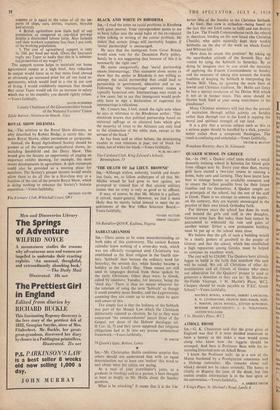SIR,ŌĆöMr. Christopher Hollis combines surprise that others should not understand
him with an equal determination not to have any 'notion' (his word to me) about what his critics are saying.
As a man of your contributor's years, as a graduate in theology and as a parson, I have thought at least as deeply as Mr. Hollis about the Sunday question.
What is he attacking? It seems that it is the Vic-
torian idea of the Sunday as the Christian Sabbath. At least, that view is orthodoxŌĆöbeing based on the fact that our Lord came to fulfil and not destroy the Law. The Fourth Commandment (with the others) is, therefore, binding on the new Israel (the Christian Church), who quite naturally kept their weekly Sabbaths on the day of the week on which Easter and Whitsun fell.
How does he attack this position? By taking up the unorthodox attitude of the Seventh Day Ad- ventist by tying the Sabbath to Saturday. By so doing he imagines that he can avoid the necessity of applying the Fourth Commandment to Sunday and the necessity of taking into account the Jewish tradition of keeping the Sabbath in interpreting the Divine Will. Thus, by ignoring the main lines of Jewish and Christian tradition, Mr. Hollis can fancy he has a special revelation of the Divine Will which is not as in former times. This stone should be thrown back hard at your smug contributor in his glasshouse!
Many Christian ministers will feel that the pursuit of recreation through selfish activity on Sunday rather than through rest in the Lord is sapping the moral and spiritual strength of our land.
It is a pity that a serious subject such as this in a serious paper should be handled by a slick, popular writer rather than a competent theologian. The result is confusing and unhelpful.ŌĆöYours faithfully,
VICTOR H. BEATON
Rougham Rectory, Bury St. Edmunds






















































 Previous page
Previous page